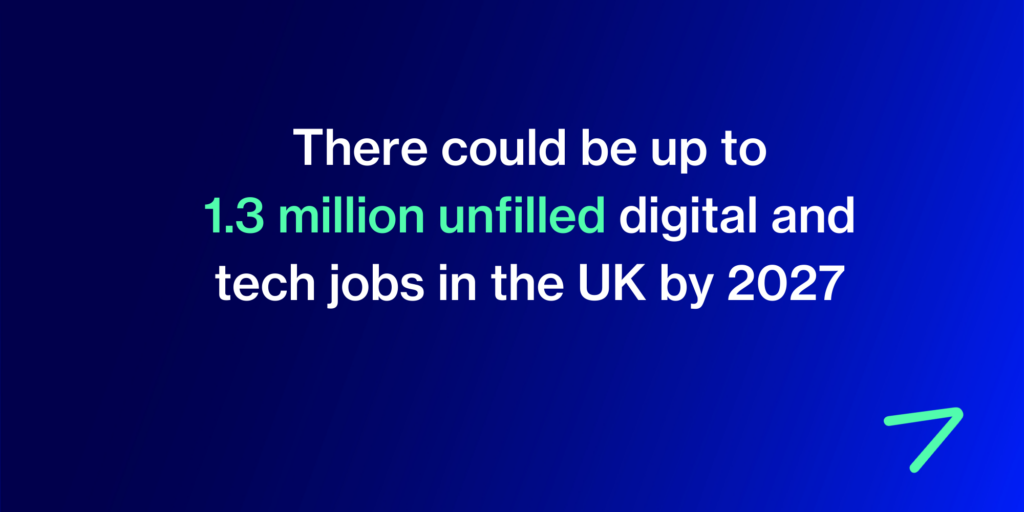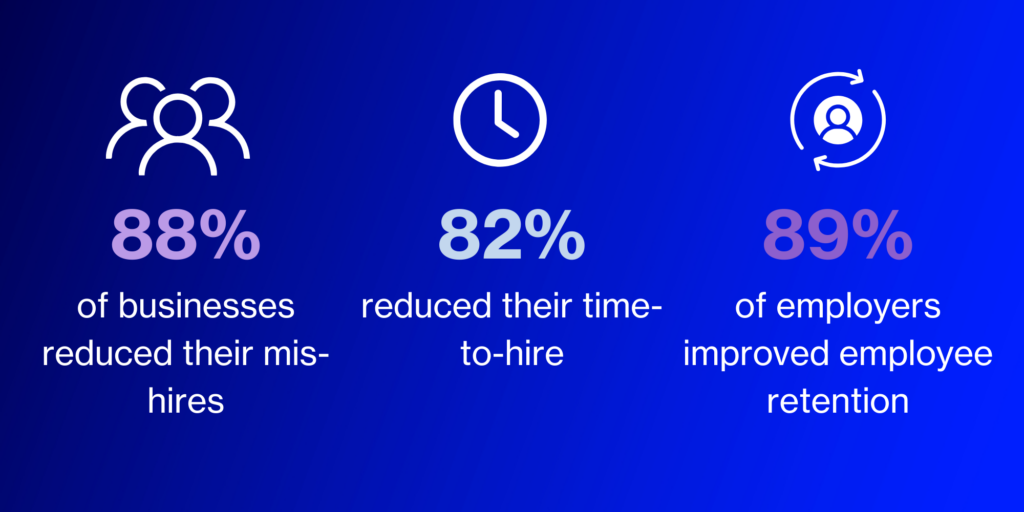Our recently published Future of Work 2024 report discusses a myriad of challenges that businesses face when it comes to attracting, engaging, and retaining talent. From economic uncertainties, talent shortages and advancements in AI – the hiring landscape continues to evolve at a rapid pace.
One of the key insights from the 100+ business leaders we surveyed, stated that over a third are concerned that are unable to recruit individuals with the necessary skills. Furthermore, the same amount believe their current workforce does not posses the skills needed for the world of tomorrow; but with 600,000 unfilled digital and tech jobs already in the UK, and with a further 678,000 set be created by 2025, how are businesses expected to plug the gap?

One of the ways is by exploring a skills-based hiring approach, where employers evaluate potential candidates, focusing on practical abilities and competencies rather than education or career progression. The aim is to hire people who are most capable of excelling in their role, not someone who looks best on paper.
The Emergence of Skills-Based Hiring
Over the last few years, skills-based hiring or skills-first hiring has emerged as a solution to a variety of converging trends. The emergence of AI and AR means that many job now require specific skills that weren’t taught in traditional education setting even a few years ago. Furthermore, the recognition and value of having diverse teams and inclusive workspaces, has prompted organisations to look beyond conventional hiring criteria, which can inadvertently favour certain demographical profiles.
By focussing on skills, companies can access a wider talent pool, including those who are self-taught professionals, career changers, and those who have acquired their skills through non-traditional means. Evidence suggests that this approach creates a more efficient hiring process that is faster, fairer, and more enjoyable, in addition to:

The Benefits of Skills-Based Hiring
1. Identify Better Candidates
By prioritising the skills necessary for the position, employers increase the likelihood of recruiting candidates who are a good fit for the job, and who can adapt quickly to their new role. What’s more, it can lead to a faster time-to-hire as companies are able to efficiently evaluate and prioritise candidates based on their quantifiable skills in early candidate assessments.
2. Broadening a Diverse Talent Pool
This approach can increase the talent by up to 10x times and helps level the playing field by prioritising transferable skills. It also allows businesses to find new, untapped talent, lessening the need to compete with other companies for the same talent.
3. Improved Performance & Productivity
Employees hired through skills-based hiring are 2.8x more likely to be high performers in their roles compared to those hired solely based on their formal education or pedigree. Overall productivity and outputs of the organisation are also greatly improved.
4. Increased Retention
One of the most significant advantages to skills-based hiring is a reduction in employee turnover rates. When candidates are hired based on their skills, they are more likely to be a better fit for the role, therefore leading to greater job satisfaction. Interestingly, those employees without degrees tend to stay at a company 34% longer than those with degrees.
Considerations in Implementing Skills-Based Hiring
Adopting a skills-based approach requires a cultural shift within organisations, as well as changes in HR practices and policies, but the evidence for such a transition is rather compelling. To do so, employers need to consider implementing:
- Competency frameworks – develop clear frameworks that define the skills and behaviours for each role (sometimes referred to as a skills and competency matrix)
- Structured interviews – drive structured interviews that are focussed upon behavioural and situational questions to assess candidates competencies
- Skills assessments – employ skills assessments and practical tasks to evaluate candidates’ abilities in a real-world context
- Anonymous hiring practices – consider anonymous CV’s to reduce unconscious bias, focusing solely on the skills and competencies of a candidates
By shifting away from traditional hiring models, a skills-first approach can unlock opportunities for millions of candidates, equipping organisations to build agile, innovative, and future-ready workforces. This approach also supports more diverse, motivated workforces, comprising of individuals who are likely to succeed in their roles. In turn, this creates better employee engagement and higher retention rates.
This is just one solution to help tackle the talent and skills shortage, and with the world of work becoming more convoluted by the week, it’s important to build a workforce that is future ready. Download our Future of Work 2024 report to discover other actionable imperatives that will enable you to remain ahead of the curve when it comes to talent attraction and retention.
Alternatively, if you’d like to discuss how to implement skills-based hiring into your process, then reach out to us at info@arrowsgroup.com.
Download our Future of Work 2024 Report